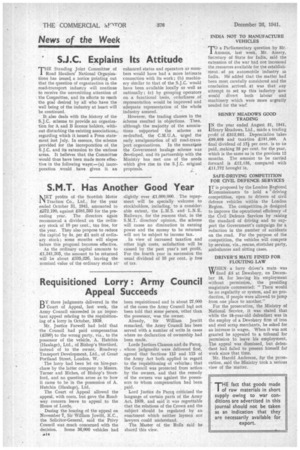Requisitioned Lorry : Army Appeal Succeeds Council
Page 16

If you've noticed an error in this article please click here to report it so we can fix it.
BY three judgments delivered in the Court of Appeal, last week, the Army Council succeeded in an important appeal relating to the requisitioning of a lorry in October, 1939.
Mr. Justice Farwell had held that the Council had paid compensation (aso) to the wrong party, viz., to the possessor of the vehicle, A. Hutchin (Haulage), Ltd., of Bishop's Stortford, instead of to the owner, Roadway Transport Development, Ltd., of Great Portland Street, London, W.
The lorry had been let on hire-purchase by the latter company to Messrs. Turner and Riches, of Bishop's Stortford, and no question arose as to how it came to be in the possession of A. Hutchin (Haulage), Ltd. The Court of Appeal allowed the appeal, with costs, but gave the Roadway Concern leave to appeal to the House of Lords.
During the hearing of the appeal on November 7, Sir William Jowitt, K.C., the Solicitor-General, said the Privy Council was much concerned with the decision. Some 36,000 vehicles had been requisitioned and in about 27,000 of the cases the Army Council ha„d not been told that some person, 'other than the possessor, was the owner.
Already, Sir William Jowitt remarked, the Army Council has been served with a number of writs in cases where no declaration of ownership had been made.
Lords Justices Clauson and du Parcq, whose judgments were delivered first, agreed that Sections 113 and 115 of the Army Act both applied in regard to the requisitioning of vehicles; that the Council was protected from action by the owners, and that the remedy of the owners was against the possessors to whom compensation had been paid.
Lord Justice du Parcq criticized the language of certain parts of the Army Act, 1939, and said it was regrettable that the relations of the Crown and the subject should be regulated by an enactment which neither laymen nor lawyers could understand.
The Master of the Rolls said he shared this view.




















































